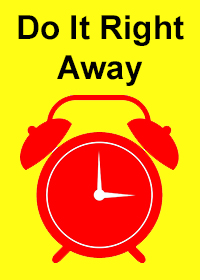Why You Should Write in the Mornings

What is the most important thing you want to do tomorrow?
Is this also the most important thing you want done a year from now?
If you’re a screenwriter, or a writer of any kind, the answer may be to write more -- to make good progress on your work and receive validation for it.
But a monster stands between you and getting that done: procrastination.
This monster works in stealth mode. It slips in and out of your life, leaving its poison in your progress before you realize what happened. Procrastination is not always obvious. It comes in the form of bad habits.
One of the worst bad habits when it comes to writing is to get sloppy in the area of discipline. This is where procrastination is sneaky. Instead of admitting that we don’t feel like writing, we’ll often come up with other reasons why we won’t. These run the gamut from “I’m too busy at the moment” to “I work more productively at night.” Much of the time, we are in denial and will come up with every excuse to not get to it.
The best way to beat procrastination is to face it head on. Do not give it the time of day. Do not even entertain the thought. This takes discipline. And discipline fuels routines which are really just normalization of a set of actions.
One thing every person does is wake up every day. Right after waking is the perfect time to execute a routine.
Here’s why the morning works:
1) This is your time. Throughout a typical day, your time may be dictated by what others want you to do. But when you decide to get up each morning is your decision. This means a time dedicated to writing.
2) You accomplished at least one important thing that day. Even if your work day was filled with unproductivity, you got done or made progress on something of significance to you.
3) Success builds upon itself. You start building patterns of doing things well that lead to more good habits throughout the day.
4) You’re implanting ideas that can churn in your head throughout the day. Giving your energy and focus on your writing first thing will sprout more ideas that you can invest into your writing at the end of the day.
5) You transform dread and guilt into positive reinforcement. Instead of being anxious that you haven’t made any movement on your writing, you know that you have already started moving the needle.
So this all requires developing a morning routine. At some point, you want to make sure you aren’t expending too much mental energy into other things before you begin writing.
If this is new to you, start small. Write for 10 minutes.
If you lack the discipline to even do 10 minutes, then start with 5. If even 5 minute requires too much, then writing’s not a priority for you.
Why only 10? After about 10 minutes, your momentum may build and compel you to keep going.
Make it as essential as brushing your teeth that morning. In fact, you can decide that you will not brush your teeth until you write. This not helps you easily remember to simply do it but it normalizes the act of writing. Just as it is normal and expected to brush your teeth in the morning before leaving for work, it is normal and expected to write first thing in the morning.
If you’re having trouble focusing in the morning, your goals may be too unrealistic. Try waking up at a reasonable time compared to when you normally do. The key is to build momentum with each realistic goal until you are used to getting up at a certain time to write. Because once you normalize writing as part of your morning routine, it will be hard not to expect doing it.
 Michael Kim
Michael Kim
Questions? Comments? Write me at InkTipStoryPower (at) gmail dot com
https://pro-labs.imdb.com/name/nm3207158/
Michael Kim has worked in every department at InkTip. He is now the VP of Product Development & Media. Besides music jamming, he likes trivia, whiskey and telling everyone he knows how surprisingly good the molcajete salsa is at Baja Fresh.
Contact InkTip
